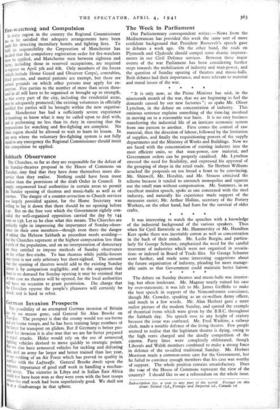" It is only now, as the Prime Minister has
said, in the nineteenth month of the war, that we are beginning to feel the demands caused by our new factories "; so spake Mr. Oliver Lyttelton, in the debate on concentration of industry. This ominous sentence explains something of the time-lag involved in moving on to a reasonable war basis. It is no easy business transferring the industrial life of an intricate economic system from one pattern to another. First comes the control of raw material, then the direction of labour, followed by the limitation of supplies, and finally the requisitioning powers of the supply departments and the Ministry of Works and Buildings. Now we are faced with the concentration of existing industry into the most efficient units, so that man-power, raw material, and Government orders can be properly canalised. Mr. Lyttelton stressed the need for flexibility, and expressed his approval of the grouping of shops in the retail trade. Sir Herbert Williams attacked le proposals on too broad a front to be convincing. Mr. Shinwell, Mr. Horabin, and Mr. Strauss criticised the scheme because it tended to entrench monopolies and squeeze out the small man without compensation. Mr. Summers, in an excellent maiden speech, spoke as one concerned with the steel industry, and naturally his experience made support of the measures easier; Mr. Arthur Hollins, secretary of the Pottery Workers, on the other hand, had fears for the survival of older crafts.
* *


























 Previous page
Previous page